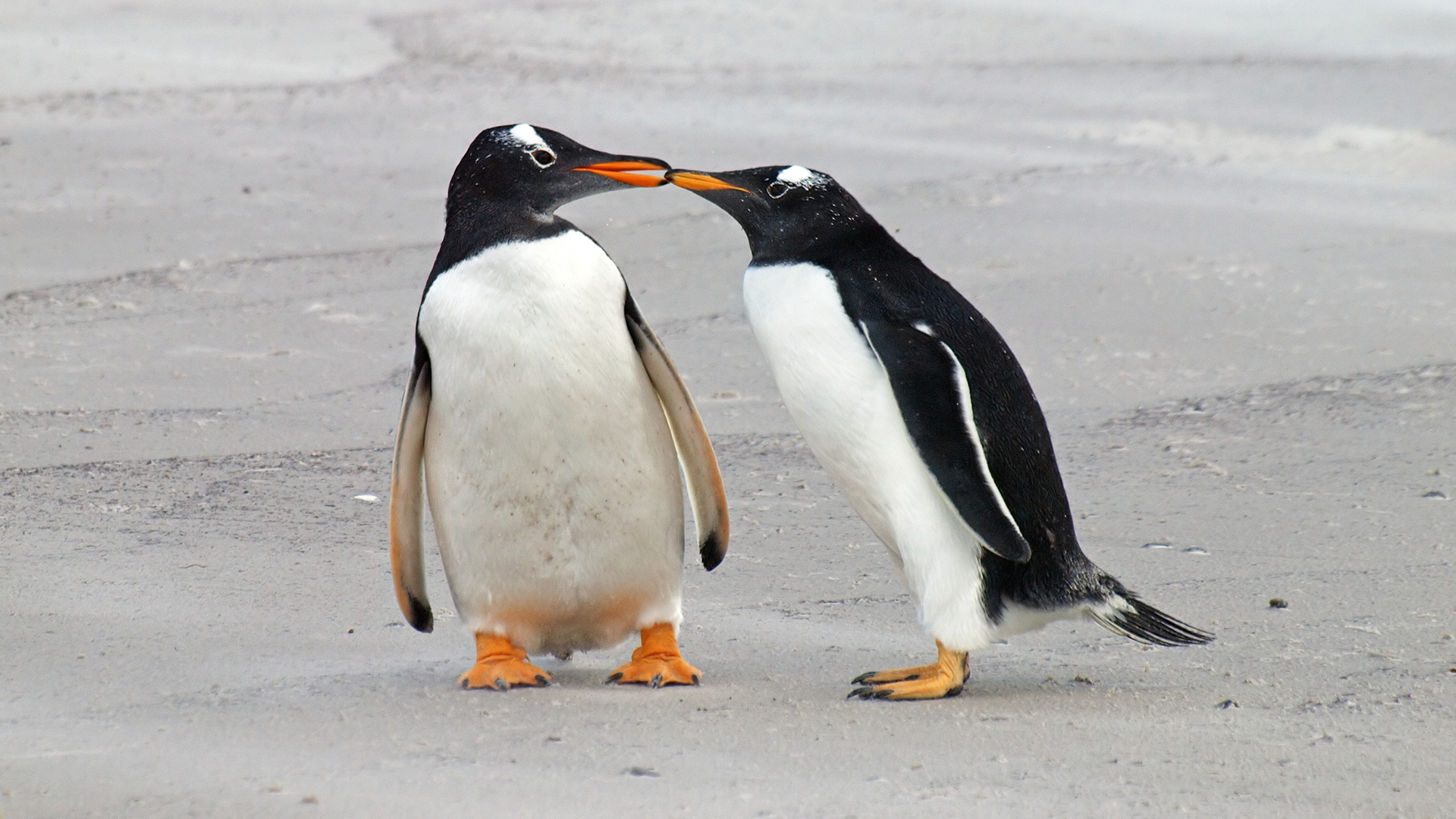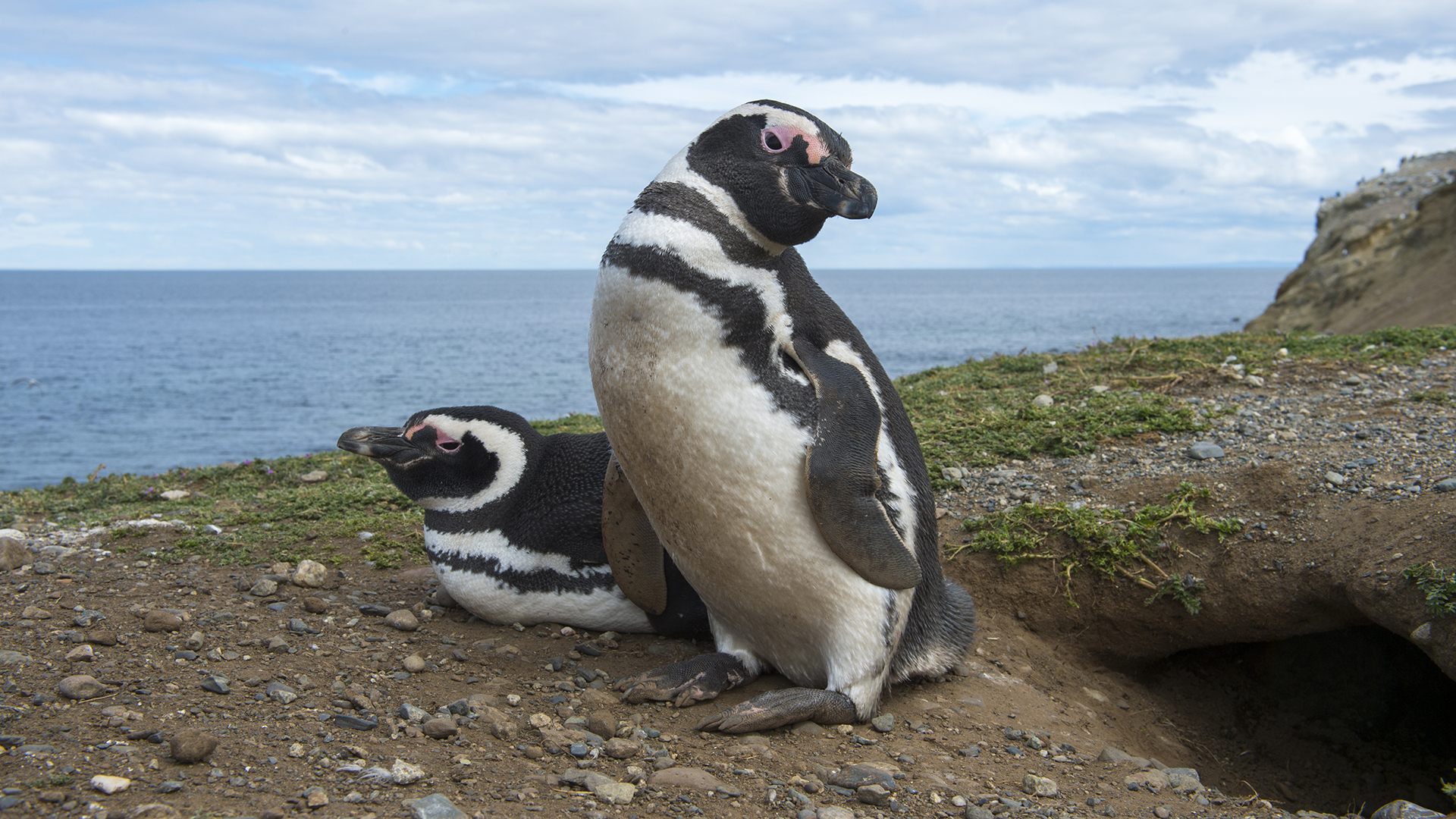Are penguins really monogamous?
It depends on how you define monogamy.

There's something sweet — perhaps even romantic — about penguin courtship. After spending months at sea, hunting for fish and swimming in the iciest waters, female Adélie penguins (Pygoscelis adeliae) toboggan to the same breeding grounds, year after year. Waddling through a bar scene of trumpeting, preening males, they ignore advances and make a bee-line for their mates from the previous season: males who’ve arrived before the females to tidy up their nest.
Such penguins are paragons of long-term commitment. But are all penguins so committed to one partner throughout their lives?
Turns out, these penguins may be the exception, not the rule. Although most penguins pair with only a single partner each breeding season, they may copulate with many other penguins in a breeding colony before settling down to nest. And fidelity rates differ widely across species. Penguin love — it's complicated.
"The short answer is no, penguins are not really monogamous," said Emma Marks, a behavioral ecologist at the University of Auckland in New Zealand, who studies breeding behavior and mate choice in colonial breeding species — birds that congregate in vast colonies for nesting. "Colonial breeders such as penguins may be monogamous, in that they have one mate with whom they nest and raise chicks each season," Marks told Live Science. "But that doesn't mean there aren't 'extracurricular activities' going on."
Related: Same-sex penguins hatch their first chick at New York zoo
It's safe to say that penguins are not sexually monogamous. Many penguins play the field before hunkering down with a mate for the season — sometimes copulating with other members of the colony who have already been spoken for, causing drama of soap-opera proportions, according to Marks.
When a pair-bonded male fails to return to the breeding grounds, for instance, his lonely mate may shack up with a different male. When that male's dutiful partner from last season arrives at the nest only to find a new female in her place, a fight ensues. The original female usually wins.
Sign up for the Live Science daily newsletter now
Get the world’s most fascinating discoveries delivered straight to your inbox.
One consequence of these messy love triangles is that, by the time a female lays her egg, it's not always clear whether the male she'll be spending the season with is raising his own chick. A 2018 study in the journal Zoo Biology described one gentoo penguin (Pygoscelis papua) in a Utah aquarium who, through the promiscuity of his pair-bonded mate, ended up raising two chicks that were the offspring of a different male. Scientists aren't sure how often this happens in nature because, while trackers and other technologies can help researchers keep tabs on mating behavior and pair bonding, there has been no concerted effort to paternity test chicks in the wild, the study authors reported.
At the same time, penguins are more or less socially monogamous. It takes two committed partners to raise a chick in a harsh environment such as Antarctica, and penguins pair bond to efficiently divide the responsibilities of nest maintenance, egg incubation and hunting.
"Social monogamy is a prerequisite," Marks said. "Raising chicks requires a lot of coordination between the two and, if that broke down, breeding would be a failure for the season."

These social arrangements can persist long-term, each breeding season bringing the same two penguin parents back to their nest for another year. How often that happens depends partly on the species. A 2013 literature review, published in the journal Comptes Rendus Biologies, found that 89% of Galapagos penguins (Spheniscus mendiculus) stick with their mates; however, at 1999 study in the journal The Auk found that only 15% of emperor penguins (Aptenodytes forsteri) seek out the same partner for subsequent breeding seasons. Most species return to the same partners at least somewhat consistently, with fidelity rates between 59% and 89%, according to the 2013 study.
The success of the previous season also plays a role in determining whether or not penguin couples stay together long-term, Marks explained. If the pair managed to raise chicks to maturity, and the male maintains a high-quality nest in a good location, the odds of a female returning to her previous partner are generally higher. Otherwise, females are just as likely to waddle off in search of greener pastures.
"For colonial species, there's a lot of choice around," Marks said. "If breeding previously failed, we generally expect to see more 'divorce' in the next season."
True rates of "divorce" — in which penguins actively snub former mates in favor of new conquests — are hard to calculate, because not every penguin returns to the breeding grounds each season. When new pairings occur, it can be difficult to determine whether it's personal, or whether the penguin moved on only after its other half failed to return — for instance if it was eaten by an orca or seal.
Predation isn't the only threat to penguins' love lives. A recent study published in the journal Ambio found that penguin populations are declining in proportion to decreases in the amount of krill available to feed on. Climate change and human fishing activities are the main factors to blame for dips in krill count, according to the study. Climate-induced shifts in sea ice are also forcing penguins into different breeding grounds, breaking up long-term couples and impacting migration. Some males are now arriving at the breeding grounds exhausted from navigating the changing landscape of sea and ice, Marks said, too unkempt to woo females and too spent to properly care for eggs.
Collectively, these factors are thought to have played a role in the widely-reported failure of Halley Bay. The breeding site that once hosted 25,000 pairs of Emperor penguins each season has been barren since 2016.
"Climate change is probably decreasing the success rates of breeding colonies," Marks said. "Whenever there are higher failure rates, we expect higher rates of mate turnover."
Originally published on Live Science.

Joshua A. Krisch is a freelance science writer. He is particularly interested in biology and biomedical sciences, but he has covered technology, environmental issues, space, mathematics, and health policy, and he is interested in anything that could plausibly be defined as science. Joshua studied biology at Yeshiva University, and later completed graduate work in health sciences at Cornell University and science journalism at New York University.









